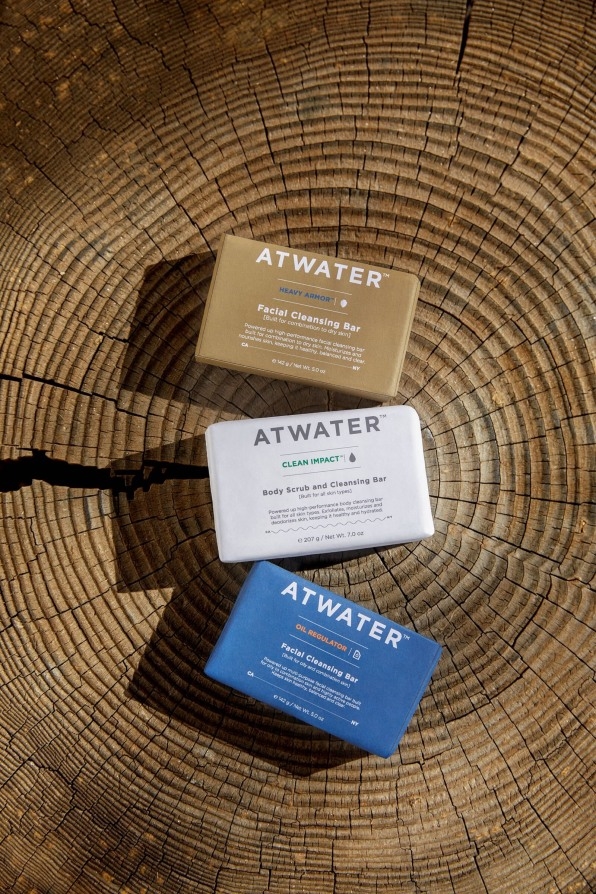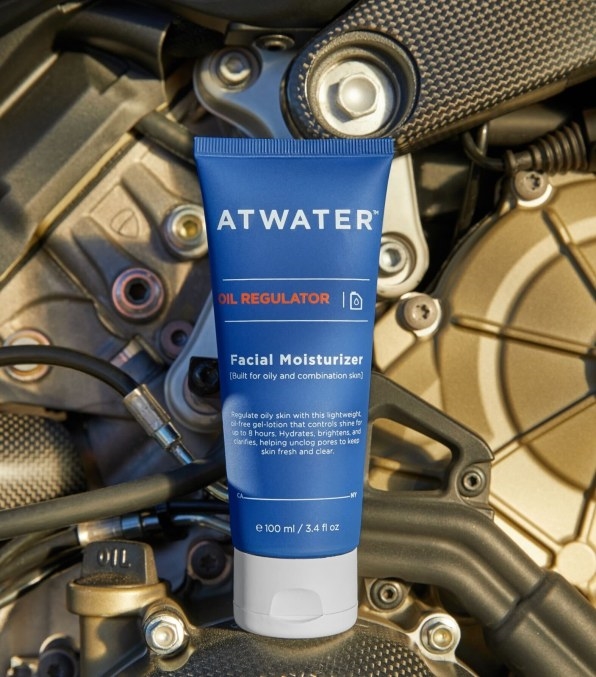Former Kiehl’s president Chris Salgardo launches Atwater, a grooming brand for men
Former president of Kiehl’s Chris Salgardo dedicated 18 years of his career to leading the New York-based brand to becoming one of the best-selling beauty brands in history. Today, more than two years after leaving Kiehl’s, Salgardo launches Atwater, a men’s grooming range named after his father’s hometown in California. At launch, Atwater will comprise of 10 products—ranging from cleanser to exfoliant to moisturizer—and will be available via direct-to-consumer channels as well as in Nordstrom store locations in the United States.
Atwater is the latest beauty brand to launch in recent memory that’s founded by industry veterans with decades of experience and institutional knowledge at their disposal—legendary makeup artist Bobbi Brown brought Jones Road to market the moment her 25-year non-compete lifted in 2020, and former Estee Lauder VP Chaz Giles debuted personalized skin-care platform Revea last year.
Inspired by Salgardo’s love of adventure sport, health, and grooming, Atwater is formulated as a “clean beauty brand,” with nontoxic ingredients and an emphasis on actives. Fast Company caught up with Salgardo to learn more ahead of his brand launch.

What inspired you to launch your skin care and grooming line now?
I’ve been ideating the concept of Atwater since I was 18 years old, when I was frequenting doctors to treat and cover my acne. At that time, I felt that there wasn’t a solution for me because skin care was focused with women at the center and there wasn’t much for men. It was about beauty, luxury, and color—something that, as a man, didn’t resonate with me at all.
During my tenure in grooming, skin care, and beauty working on Chanel, Bobbi Brown, Shu Uemura, Giorgio Armani Beauty, and especially my 18 years on Kiehl’s, it was apparent to me how many more options there were for women than men.
With over 30 years of beauty industry experience, I have researched, launched, and tried a lot during my tenure. Most men’s products felt very much the same, packaged in black and gray and merchandised at the back of the store—where no man would discover it. And I wanted to move away from skin care that was fragranced and used drying alcohol and other ingredients that were just unnecessary and even potentially toxic.
I personally wanted to build a brand with performance at the core and with a simplistic design that would appeal to the modern man, but in no way intimidate him. As a consumer, I set out to create smart, necessary, and honest products that would make him look better, fit into any man’s routine—no matter his age or skin type—and at an accessible price point.
The concept of the brand also pays homage to my father’s hometown of Atwater, CA, which happens to turn 100 years old on our launch day.
Looking at the landscape of men’s grooming and skin-care products, what do you think have been some of the biggest pitfalls when brand haves tried to enter this space in the past?
Expertise and research are critical in developing products for men. We (as men) have always been on a different journey than women, with far fewer choices. Also, many men continue to be in the starting blocks in their routine, meaning most haven’t advanced to the right product portfolio as women have. I took all of the following into consideration when developing each product that would meet him where he is on his skin-care journey. So the product would have a clear purpose, the collection would deliver desired results, and ultimately compel the customer to embrace his skin-care journey.
At the end of the day, I want Atwater to be synonymous with high-performing products and clean ingredients that simplify his routine. I am on a mission to get men to embrace their skin-care journey to be more than just a bar of soap. But, if it happens to be a bar of soap, it better be functional.

What are some of the most important issues in skin care and grooming that men are concerned with?
Thirty years ago, it was about shaving cream and maybe a bar of soap. Today’s man is more sophisticated due to shifts in marketing and brands giving them access to products that fit their routine and budget. He is also embracing self-care and wants to have time for himself and products that make him feel good.
Our consumer is most concerned about looking his best. Whether with his clothing or his personal care, he wants goods that suit him and suit his lifestyle. He also doesn’t want to be lectured about a 10-step, skin-care routine, or the latest in ingredient innovation. Men want comfort in their skin care, which is why texture played an integral role in our formulations. Leaving scent out of our skin care was intentional, because it’s very specific for users, and especially for men.
How do you predict the men’s skin care and grooming market will grow in the next decade?
I believe that men will continue to develop their skin-care routines much more aggressively. We are also seeing folks from across the country, not just the coasts, shift in their beliefs to prioritizing self-care. Eco-friendly packaging and nontoxic formulas without fragrance will be more critical. We also believe there are new categories men will want to be in, and we are currently working on those developments for next year. So, there’s more to come.
(36)


